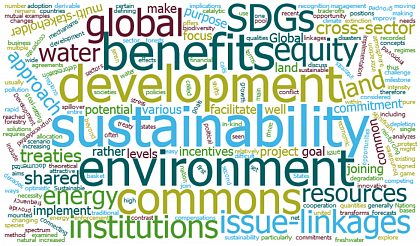Tailoring benefit-sharing for sustainability of global environmental commons

Projekt Soliev
Researcher: Dr. Ilkhom Soliev
Collaboration on various - from local to global - levels is both the defining necessity and the main challenge of global environmental commons. Global environmental commons such as atmosphere, climate, biodiversity, forests, shared land and water resources, are common pool resources sustainable management of which often requires collaboration beyond boundaries of any single nation as well as on multiple levels within individual states and across regions. The recent decades have seen rapid growth of collaborative arrangements that aim to protect environmental commons. However, there is an increasing concern that due to development needs of societies and impact from changing environment (particularly climate), the current stress mounted on environmental commons offsets the effects of existing efforts. Examples include increased frequency and intensity of recorded natural disasters, depletion and pollution of freshwater resources, degradation of agricultural land resources and deforestation, extinction of species and more, all of which often affect already disadvantaged groups of population most, raising the questions of equitability and justice. The adoption of the Sustainable Development Goals by the United Nations marks a significant milestone in achieving universal recognition for necessity of transformations across all spheres of human-environment relationships. Yet, implications from interaction across various goals, as well as from existing governance arrangements and path dependencies, which might be both competing and mutually reinforcing, are not yet well understood.
The purpose of this project is to facilitate understanding of benefit sharing as a governance approach that can enable change towards both social and environmental sustainability of commons. This is done through broader historical-institutional, regime and discourse analyses, as well as more actor-oriented observational and experimental social research methods. Cases from various cultural and political contexts are studied to explore and develop wider theoretical foundations of the approach.
Although there is overall progress on making commitment towards various goals (e.g. SDGs) and reforms both globally and locally, there is a broad range of underlying challenges from agenda setting through implementation phases of these policies. The project analyzes, first, policy-institutional drivers (norms and rules) that support or hinder actors in making a commitment towards a certain goal or reform, and second, social-environmental outcomes as these commitments are implemented. The particular attention is on three qualities that make benefit sharing a promising governance approach to bring about necessary transformations. First, based on game theoretical concepts benefit sharing aims to improve net benefits for all, making it capable to transform the very potential of conflict over rights into an opportunity to cooperate for improved benefits. Second, benefit sharing calls for innovative solutions where benefits can be considered not only in pure economic terms but also across the entire spectrum of the so-called ‘basket of benefits’ including environmental, political and cultural-catalytic (spillover) benefits. Third, the approach offers a wide range of mechanisms which generally could be grouped into (a) monetary and in-kind compensations and (b) issue linkages, where social and environmental impacts from policies can be improved by cross-cultural and cross-sectoral learning of comparative advantages between actors (e.g. embedded values, traditional knowledge, scientific and technological advancements). The overarching research question is whether and how better understanding of needs and benefits as well as sharing arrangements can help transform social-environmental interactions into more sustainable ones.

